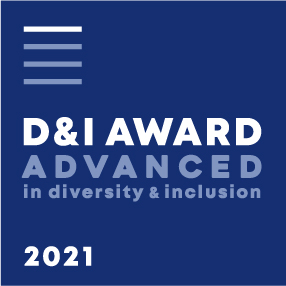Diversity, Equity, and Inclusion
1. CEO Message
We are proactive in devising and implementing Environmental, Social and Governance (ESG) strategies and measures and have two main focuses at JSR. Our first is to have dynamic reviews and changes to our materiality to meet constantly evolving business and societal needs. Our second is on bolstering group management on a global scale by enhancing employee engagement through initiatives such as Diversity, Equity & Inclusion.
Bridging gender, cultural, and identity-related divides, by truly understanding what is happening and what drives it, is vital in creating a globally united JSR that affords all employees the chance to realize their true potential. This is also key in making JSR an attractive option for potential recruits. At its essence, this is every bit as much a business strategy as it is an ESG-related undertaking.
Eric Johnson
Representative Director, CEO
(From the CEO Message, JSR REPORT 2022)
2. Philosophy
To be a sustainable, resilient company, JSR Group is actively working to create an inclusive culture where diverse human resources mutually trust and accept one another’s presence and views, can demonstrate their individual skills fully, and thereby develop this diversity and inclusion as organizational strengths.
We have added equity to the concept of diversity and inclusion used thus far and are using the expression, diversity, equity, and inclusion (DE&I). This means that individuals work under many different environments and circumstances, and the company coordinates and provides opportunities and resources equitably and fairly, according to the circumstances and needs of each person.
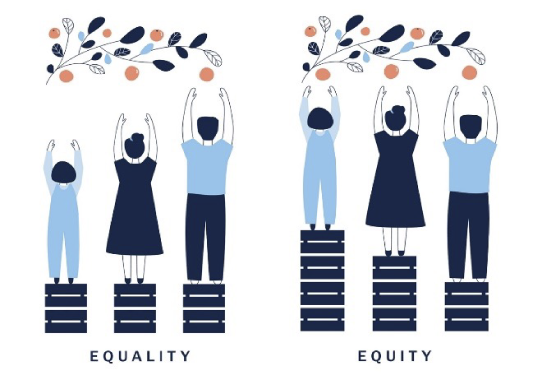
Equity: Coordinating and providing resources according to the circumstances of each person
By creating opportunities for employees to proactively take on challenges, develop careers, grow, and play an active role based on DE&I, JSR Group can increase employee engagement, reinforce organizational strengths and competitiveness, and evolve into a resilient organization that can respond flexibly to many different changes in the business environment. We think that will lead to sustainable growth of JSR Group.
Especially in work styles, we are pushing ahead on work-life management by providing systems to support both work and life, work-from-home and other systems, and enhancing infrastructure, and by incorporating diverse workstyles. This will provide management that leads to the manifestation of each person’s capabilities as well as results and stronger competitiveness as an organization.
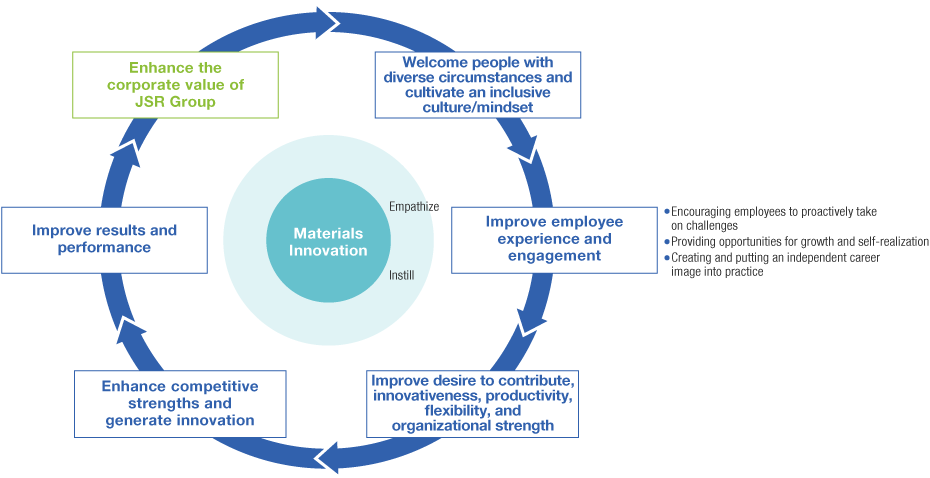
3. Advancement Structure
JSR established a Diversity Development Office in 2015 as an organization dedicated to the advancement of diversity, equity, and inclusion (DE&I). The office’s primary focus has been on providing active support for the active participation and advancement of female employees and helping employees balance work with childcare, nursing care, and other family duties. However, its mission is to establish and implement initiatives that enable diversity in the workforce. JSR Group must address a range of categories that go beyond just gender differences. Examples include promoting participation by foreign nationals and individuals with disabilities, supporting employees who work while also dealing with nursing care or illness, bridging the generation gap, and accepting members of the lesbian, gay, bisexual, transgender, and queer / questioning (LGBTQ) community. Instead of just accepting diversity, we aim to embrace it and utilize individuality as an asset.
Since FY2020, we have positioned DE&I as a global JSR Group initiative. One aspect of this is the assignment of a DE&I officer to JSR North America Holdings. As we share this global orientation, we are incorporating the perspectives of each country and organization, and tackling DE&I issues that differ from one organization to another.
In FY2021, we established the GUMBO internal DE&I portal site to share our policy and views on DE&I, the details of initiatives, and the latest information relating to DE&I with employees and help them understand DE&I better.
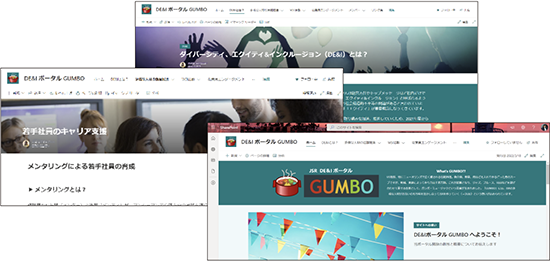
4. Promoting Active Participation and Advancement of Diverse Human Resources
(1) Promoting Active Participation and Advancement of Women in the Workforce
(i) Gender Ratio and Targets Set for 2030
The gender composition of JSR Group globally is about 30% female and 70% male. When the percentage of females is viewed in terms of job position, the percentage of females in officer and managerial positions together is around 20%. The percentages at the non-consolidated level are low, with females accounting for around 20% of JSR, 12% of officers, and 5% of managerial positions. There is a substantial difference in the gender composition of employees and in the upper ranks compared to JSR Group on a global basis.


While we have pursued various initiatives to support the careers of female employees at JSR thus far, we set a new target of having women in 10% of managerial positions by 2030 and will put effort into this as a management issue. This initiative is one of those aimed at supporting the advancement of diverse human resources and we are setting clear targets and KPI and reinforcing initiatives to achieve this as a social issue unique to Japan.

(ii) Action Plan and Results for the Act on Promotion of Women’s Participation and Advancement in the Workplace
We developed the JSR Action Plan for the Advancement of Women in the Workplace (Third Phase, April 1, 2020 to March 31, 2023) and are implementing initiatives based on the Act on Promotion of Women’s Participation and Advancement in the Workplace (Women’s Act), which was enacted in April 2016.
| 1. Third Phase Period | April 1, 2020 to March 31, 2023 |
|---|---|
| 2. Issues |
|
| 3. Quantitative Goals |
|
| 4. Details of Measures |
|
One example of success is the “Eruboshi (Stage 2)” designation that JSR earned in 2019 after being certified by the Minister of Health, Labour and Welfare as a company that is making outstanding efforts to “promote women’s participation” based on the Act on Promotion of Women’s Participation and Advancement in the Workplace.
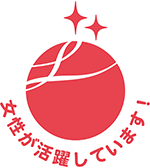
(iii) Trend in Performance
JSR is actively working to hire female employees. We have set targets for the percentage of female new graduates hired since 2010.
| Target | FY2017 | FY2018 | FY2019 | FY2020 | FY2021 | |
|---|---|---|---|---|---|---|
| Percentage of women hired annually per position | College graduates, engineering positions: 30% *1 | 20% | 18% | 22% | 26% | 30% |
| College graduates, administrative positions: 50% *2 | 50% | 45% | 50% | 55% | 60% | |
| Percentage of women in managerial positions | March 2023: 6% | 3.8% | 4.1% | 4.3% | 4.1% | 4.5% |
*1 As of April 1 of each fiscal year
*2 Set from the ratio of male and female students
The percentage of women in managerial positions at JSR is 5.6% (as of April 1, 2022) and this percentage is increasing every year. However, this differs substantially from the percentage of female employees and we continue to take various approaches to address this.
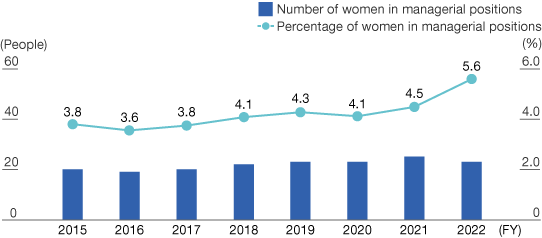
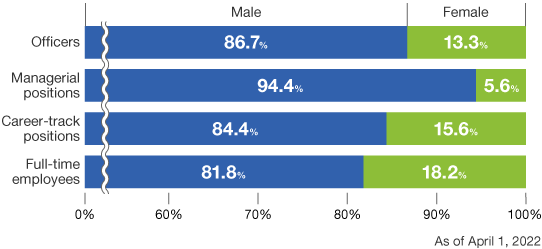
(iv) Initiatives to Promote Advancement of Women
At JSR, it is a common practice for women to continue working even after marrying and having children. However, that is not the only goal. We are working to develop working women who contribute actively and grow over the long term while striving for self-realization, and who can contribute to the growth of the Company.
| Female officers | Managerial positions | Females in managerial positions |
Female employees | People who have switched to career-track | |
|---|---|---|---|---|---|
Training for managerial positions
|
〇 | ||||
| Career development seminar for female employees of the section chief level (2016 to 2019) | 〇 | ||||
| Dispatch to external training (NPO J-Win) (2019 onward) | 〇 | 〇 | 〇 | 〇 | |
| Interviews of female employees / managers (2016 onward) | 〇* | 〇* | |||
| Interviews of the superiors of female employees (2016 onward) | 〇 | ||||
| Seminar for people who switch to career-track (2010 onward) | 〇 |
* Career counseling is provided as needed
Training for managerial positions
We provide management support training for those in managerial positions to learn the skills to appropriately consider the needs of each female subordinate and empower subordinates. We also provide a seminar for managers to confront their own unconscious biases and encourage them to modify their behavior to avoid microaggression.
Dispatch to external training (NPO J-Win)
Interviews of female employees
Since FY2016, we have conducted interviews with several dozen female employees a year to ask them about job satisfaction, issues they are experiencing in their work, and what their views of a future career are, among other topics. These interviews include elements of career counseling.
Interviews of the superiors of female employees
Since FY2016, we have interviewed several dozen superiors of female employees each year to ask about the temperament and talents of each female subordinate and confirm plans for development. We also ask about issues in pursuing DE&I. The issues identified through these interviews of female employees and their superiors are analyzed and reported to management and we adopt approaches that will lead to measures to address the issues.
We also hold seminars on individual themes and provide support as requested when necessary, in addition to such initiatives.
(2) Providing Support and Promoting Advancement of Employees Who are Caring for Children
Since the beginning of the 2000s, JSR has established various systems to support employees in balancing childcare and work. This is not only aimed at achieving a balance between the two. We are also working to create a workplace that makes it easy for people to work, provides job satisfaction, and enables people to work with enthusiasm and contribute, even in workplaces where people adopt diverse workstyles.
(i) Action Plan and Results for the Act on Advancement of Measures to Support Raising Next-Generation Children
We developed the JSR's Next Generation Development Action Plan (Eighth Phase, April 1, 2020 to March 31, 2023) and are implementing initiatives based on the Act on Advancement of Measures to Support Raising Next-Generation Children, which was enacted in April 2005.
| 1. Eighth Phase Period | April 1, 2020 to March 31, 2023 |
|---|---|
| 2. Current Issues |
|
| 3. Numerical Objectives | Achieve the following minimum levels for the childcare leave-taking rate and length of leave during the Eighth Phase: Male employees: Leave-taking rate: 30% or higher Number of leave days taken: Average of ten days or more |
| 4. Details of Measures |
|
(ii) Trend in Performance
(3) Providing Support and Promoting Advancement of Employees Who Are Providing Nursing Care
Today, Japan is facing a “super-aging society.” It is reported that about one in four people in Japan aged 75 or older requires nursing care, and the number of employees who are faced with providing such care is expected to increase. JSR is preparing a variety of support measures that allow employees who provide nursing care to balance that care with their work.
In addition to such support measures, we offer an e-learning course on nursing care to all employees. The purpose of this course is to increase their understanding of the systems and services available to them and prepare them before they confront the need to actually provide nursing care. We also educate those in managerial positions on how to respond and support subordinates when they are working and caring for family members. Through such measures, we are working to create a culture that understands and accepts employees experiencing a diverse range of circumstances, along with enabling employees to experience job satisfaction and continue to work while providing nursing care when they face the need to do so.
| FY2017 | FY2018 | FY2019 | FY2020 | FY2021 | |
|---|---|---|---|---|---|
| Shorter working hours system | 3 | 1 | 1 | 2 | 1 |
| Nursing care leave system | 8 | 7 | 11 | 6 | 4 |
| Extended nursing care leave system | 0 | 1 | 3 | 0 | 0 |
(4) Career Support for Young Employees
We began a mentoring program for young employees in FY2021. Young employees who joined the company around the time the COVID-19 pandemic began were forced to work from home for an extended period of time. This substantially changed the means, quality, and quantity of communication compared to before the pandemic and we felt a sense of urgency over whether this made them more susceptible to feeling a vague sense of anxiety. We also undertook the mentoring program because the experience of major changes in the environment also heightened the awareness of young employees about developing their own careers.
The objectives of mentoring are to 1) provide young employees (mentees) with the opportunity to create a relationship with a senior employee outside of their own division and create a means for them to consult someone about their work and career, or matters outside of work, and to 2) provide senior employees who serve as mentors experience in developing successors, the opportunity to reflect on themselves, and support growth through mentoring. This not only creates personal connections for and assuages the mentee’s concerns about work; it enables both the mentor and mentee to experiences the benefits of mentoring and we plan to continue the mentoring program next fiscal year.
(5) Expanding Hiring of Mid-Career Employees and Promoting Active Contribution
JSR thinks that being chosen by human resources who possess a diverse range of knowledge, skills, and ideas and having them contribute actively will spur innovation and lead JSR to continue to provide value to society. For that reason, we actively hire human resources from a diverse range of backgrounds as mid-career employees.
| FY2017 | FY2018 | FY2019 | FY2020 | FY2021 | |
|---|---|---|---|---|---|
| Male | 23 | 31 | 25 | 22 | 30 |
| Female | 4 | 11 | 7 | 3 | 5 |
| Total | 27 | 42 | 32 | 25 | 35 |
(6) Promoting the Reactivation of Resigned Employees
JSR established and operates a Career Re-Entry System to enable employees who voluntarily left JSR and the workforce (due to marriage, childbirth, nursing care responsibilities, or the transfer of a spouse, for example) to register for rehire in accordance with company needs and the former employee’s desires. The number of employees being stationed overseas is also increasing as globalization progress, and the spouse is also a JSR employee and accompanies him/her overseas, in some cases. Because it is easier to use a system that enables re-entry without retirement when the date of return has been set, we established a new system of leave for spouses transferring overseas in FY2020. This system enables spouses to take leave for up to two years.
| FY2017 | FY2018 | FY2019 | FY2020 | FY2021 | ||
|---|---|---|---|---|---|---|
| Career Re-Entry System | Number of people registered | 4 | 5 | 5 | 3 | 1 |
| Number of people employed | 1 | 2 | 2 | 2 | 0 | |
| Spouse Overseas Transfer Leave System | Number of using system | -* | -* | -* | 0 | 1 |
* Implemented in FY2020
(7) Employment Opportunities Beyond Retirement
In accordance with the Act on Stabilization of Employment of Elderly Persons, JSR has systems in place that enables employees who have reached the mandatory retirement age to stay in the JSR workforce. Prior to retirement, employees complete a survey concerning their desire to continue employment. All of those who wish to continue working are re-employed. We also hold life planning seminars before mandatory retirement to provide information and educate retirees on future life planning and career planning.
| FY2017 | FY2018 | FY2019 | FY2020 | FY2021 | |
|---|---|---|---|---|---|
| Number of people re-employed | 53 | 38 | 22 | 24 | 18 |
| Percentage of people re-employed | 72% | 81% | 81% | 86% | 69% |
(8) Promoting Active Contribution of Foreign Nationals
Sixty percent of JSR Group’s revenue comes from overseas, and 50% of its employees are affiliated with overseas businesses. Based on this unique characteristic of JSR, we engage in corporate activity that is founded on the leadership of a CEO who is well acquainted with circumstances in Japan and abroad. Moreover, to secure personnel who can succeed on the global stage, we promote the development of workplace environments where employees of different nationalities, religions, and lifestyles can work together while demonstrating their own unique characteristics.
JSR Group has long been working to expand hiring and diversify its human resources as part of promoting the globalization of employees by hiring foreign university students and accepting employees from overseas subsidiaries at JSR. We are strengthening the network of human resources departments in Japan and overseas in JSR Group along with our hiring activities. JSR Group will also consider promoting local human resources to management of overseas subsidiaries and promote exchanges between human resources in Japan and overseas.
(9) Providing Support and Promoting Advancement of Employees with Disabilities
As of the end of FY2021, JSR’s employment rate of individuals with disabilities was 2.24%, owing to the impact from the spin-off of the Elastomers Business. This caused the employment rate to temporarily fall below the statutory employment rate 2.3% (the employment rate was 2.59% as of April 1, 2022).
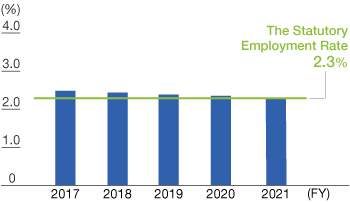
When we hire people with disabilities, we discuss their strengths and the details of their disability, and then determine the work location and type of that best suits each employee’s situation.
Although few employees with disabilities work in areas where hazardous materials are handled, such as manufacturing and research laboratories, we are working on ways to ensure safety while expanding employment opportunities for people with disabilities. In September 2021, we also established a farm (in Saitama Prefecture) mainly operated by people with disabilities to give even more people with disabilities the chance to work as a member of JSR team and join us in building a society where everyone can work with enthusiasm and contribute actively. This farm began with preparing a vacant lot and staff worked together to install planters. After consulting members of headquarters and local staff, it was named JSR Nanairo (“Seven Colors”) Farm and we are telling everyone in the company about it.
Seeds were planted in December 2021 and the first mesclun greens and radishes were harvested in February 2022. A repeated process of trial-and-error led to a harvest of komatsuna (mustard greens), garland chrysanthemum, and lettuce leaves large enough to provide in the cafeteria in March 2022. Employees who work at headquarters joined in the harvesting, washing, and shipment work. The harvested vegetables were shipped directly to JSR Yokkaichi Plant and offered as “parboiled Komatsuna and garland chrysanthemum” and “corn salad on a bed of lettuce” in the plant cafeteria.
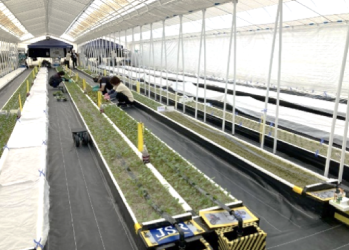
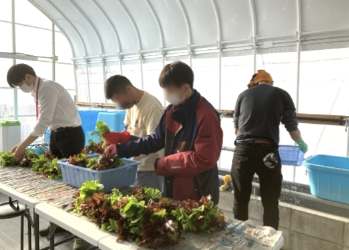


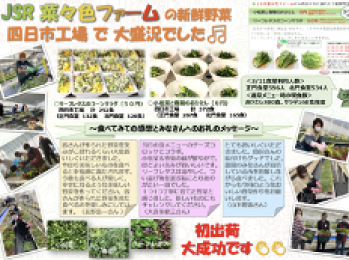
(10) Support and Promoting Understanding of LGBTQ Individuals
JSR aims to build a workplace in which all people can be accepted for who they are without pretense and work with enthusiasm in their own way. LGBTQ is no exception to this philosophy, and we do not tolerate any exclusive treatment or discriminatory words or behavior.
Along with providing the option of “other” in addition to “male” and “female” in the gender section of the entry form for new employees, we provide an e-learning course for employees and pursue initiatives to think about our vision of diversity. JSR has also endorsed the Business for Marriage Equality campaign to advocate for legalizing same-sex marriages. We want to do our part as one company to advocate for gender equality in society as a whole. While we are still only halfway there at present, we will focus on this more in the future.
JSR was recognized as a company ranked in the Advanced category of D&I AWARD 2021
JSR was ranked in the Advanced* category of D&I AWARD 2021 (December 14, 2021, sponsored by JobRainbow), which recognizes companies in Japan that work on diversity and inclusion.
There are many perspectives and issues to think about in order to achieve diversity, equity, and inclusion. This award evaluates companies from the five perspectives of Gender, Childcare/Nursing Care, Disabilities, Coexistence of Diverse Cultures, and LGBT. We understood that JSR has room for improvement from the three perspectives of Coexistence of Diverse Cultures, Disabilities, and LGBT, particularly in consideration for work styles, community building, and providing education. We recognize that it is time to move beyond limited attributes such as gender that can be easily recognized on the surface, and accelerate initiatives focused on the deeper layers of diversity such as the diverse attributes, unique characteristics, values, and experience that each person possesses. In the future, JSR will make an even greater effort to pursue initiatives aimed at utilizing the unique characteristics of each individual, rather than just accepting the many types of diversity in human resources.
* Advanced rank: A recognized rank in the D&I AWARD. This rank requires that a company be “A leader in D&I, even among domestic companies in Japan that is leading the promotion of D&I as a role model. The requirement is a company that undertakes a wide range of initiatives from multiple perspectives, fosters an internal culture where each employee respects D&I, and continues to work on further innovation.”
